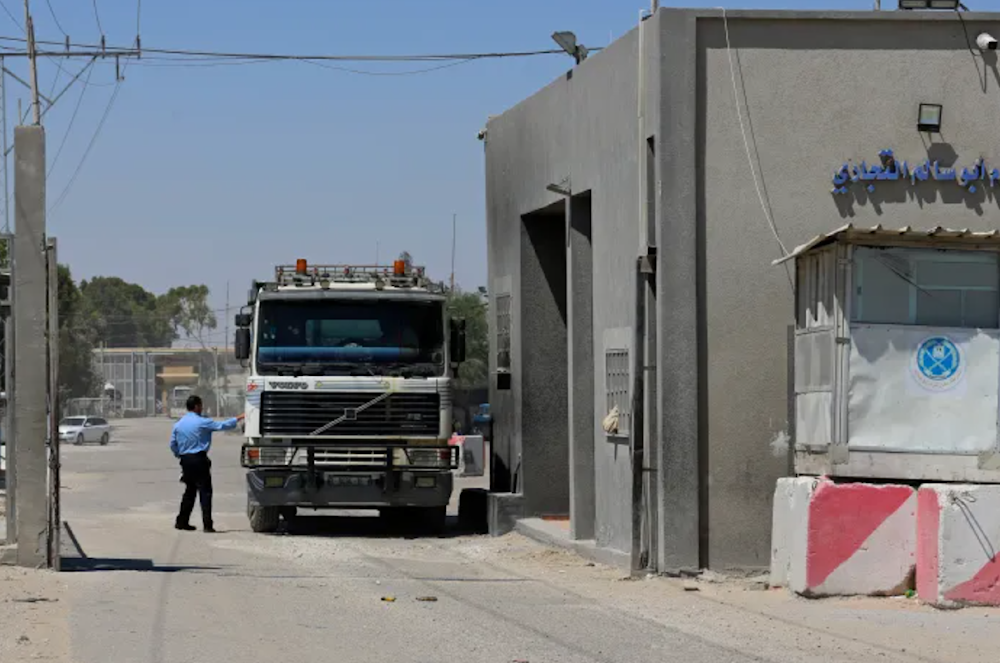Egypt, US agree to send aid through Karem Abu Salem crossing
US President Joe Biden and Egyptian President Abdel Fattah el-Sisi struck an agreement over the phone due to the dire humanitarian situation in Gaza.
-

A security officer checks a truck entering Gaza at the gate of the Karem Abu Salem cargo crossing, undated. (AP)
Egypt and the US agreed on Friday to temporarily provide humanitarian supplies to the United Nations in Gaza through the Karem Abu Salem crossing until legal measures are developed to restore the Rafah border crossing from the Palestinian side, according to a statement by the Egyptian presidency.
The deal was prompted by "the difficult humanitarian situation of Palestinians in the Gaza Strip, the lack of means of life in the Strip, and the lack of fuel needed for hospitals and bakeries," according to the statement, which highlighted that US President Joe Biden and Egyptian President Abdel Fattah el-Sisi struck an agreement over the phone.
The two leaders also agreed to step up global efforts to make the Gaza ceasefire negotiations a success and halt the "prolonged human tragedy experienced by the Palestinian people," the statement further read.
This comes as WAFA news agency also reported, citing a statement issued by the Palestinian presidency, that the Palestinian Authority and Egypt agreed to temporarily send humanitarian aid to Gaza through the Karem Abu Salem crossing until an agreement is reached to reopen the Rafah crossing.
Gaza-bound food left to rot in the sun amid Israeli closure of Rafah
Food supplies awaiting entry into Gaza from Egypt have begun to rot, as the border crossing remains closed by Israeli authorities for the third week now.
Rafah was a major entry route for minimal humanitarian aid and commercial commodities before "Israel" escalated its aggression on May 6, seizing control of the crossing from the Palestinian side.
According to Egyptian authorities and sources, the military aggression continues to jeopardize humanitarian efforts, and "Israel" must return the crossing to Palestinians.
A backlog of aid has accumulated on the road between the Egyptian side of the border and the town of al-Arish, which is roughly 45 kilometers (28 miles) west of Rafah and serves as an entry point for foreign humanitarian deliveries.
A truck driver told Reuters that his products had been on his truck for a month, slowly rotting in the heat. "Apples, bananas, chicken and cheese, a lot of things have gone rotten, some stuff has been returned and is being sold for a quarter of its price," he added.
"I'm sorry to say that the onions we're carrying will at best be eaten by animals because of the worms in them."
According to UN data, no vehicles have traveled via Rafah since May 5, and just a handful have passed through the neighboring Israeli border of Karem Abu Salem crossing.
The number of people awaiting assistance has increased substantially, with some trapped for more than two months, according to Khaled Zayed, head of the Egyptian Red Crescent in the region.
Zayed reported that some items are in need of specific temperatures, expressing hope that the border will reopen "as soon as possible."
Some food was sold at a discount on the local market in northern Sinai, resulting in the confiscation of supplies of rotting eggs, according to local authorities from Egypt's Ministry of Supply.
Hamas welcomes ICJ ruling on Rafah, says it was insufficient
The top United Nations court on Friday ordered "Israel" to "immediately" halt military attacks on Rafah, marking a landmark ruling that is expected to heighten international pressure on the occupation entity more than seven months into its genocidal war on the Gaza Strip.
The International Court of Justice (ICJ) also ruled that "Israel" must keep open the key Rafah crossing for "unhindered" humanitarian aid and urged the "unconditional" release of captives taken by the Palestinian Resistance since October 7.
On its part, Hamas hailed the UN top court's ruling for "Israel" to immediately halt its attack on Rafah but criticized its decision to exclude the rest of Gaza from the order.
Holding "Israel" fully responsible for the deteriorating humanitarian conditions in the Gaza Strip, Egypt said in a statement by the Foreign Ministry that it "calls on Israel to comply with its legal obligations within the framework of the Convention on the Prevention and Punishment of the Crime of Genocide and international humanitarian law and to implement all interim measures issued by the ICJ."
It also called "on Israel to stop its systematic policies against the Palestinian people of targeting, starvation and siege in violation of all provisions of international law and international humanitarian law."

 4 Min Read
4 Min Read








